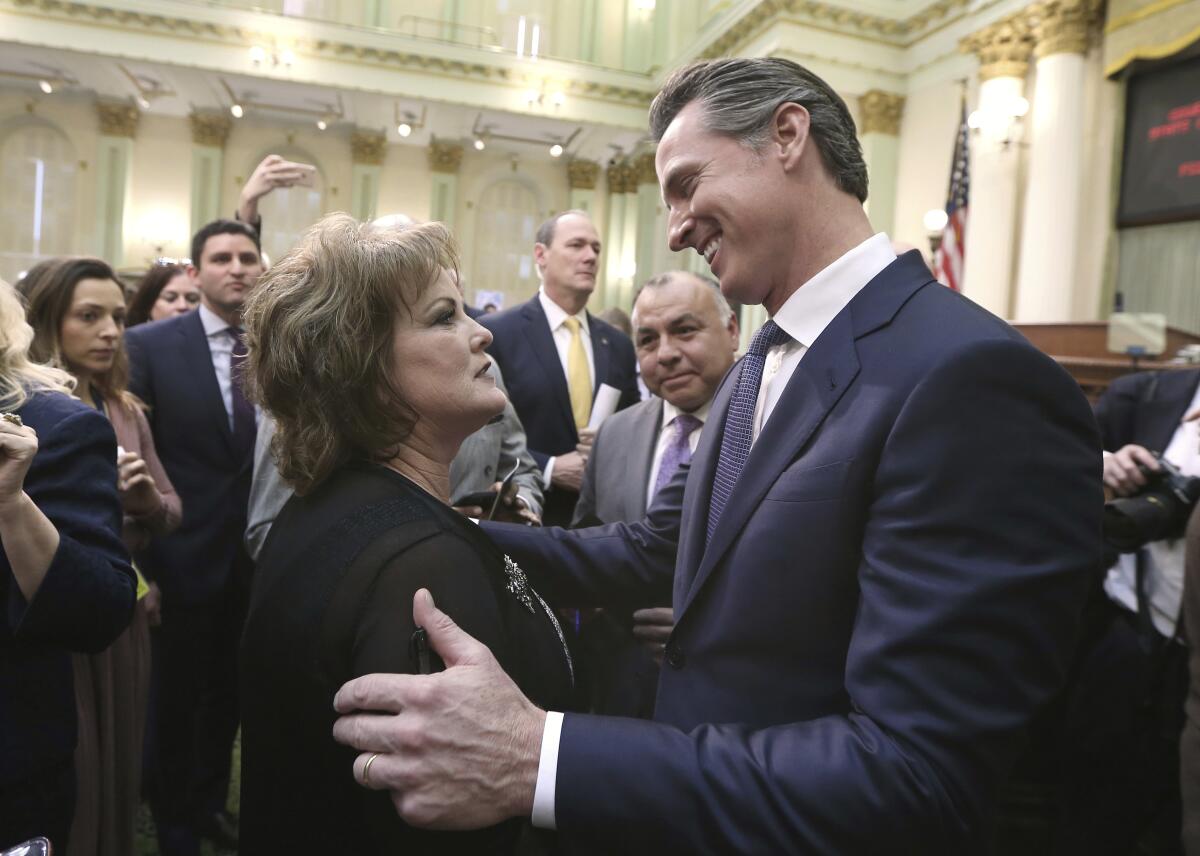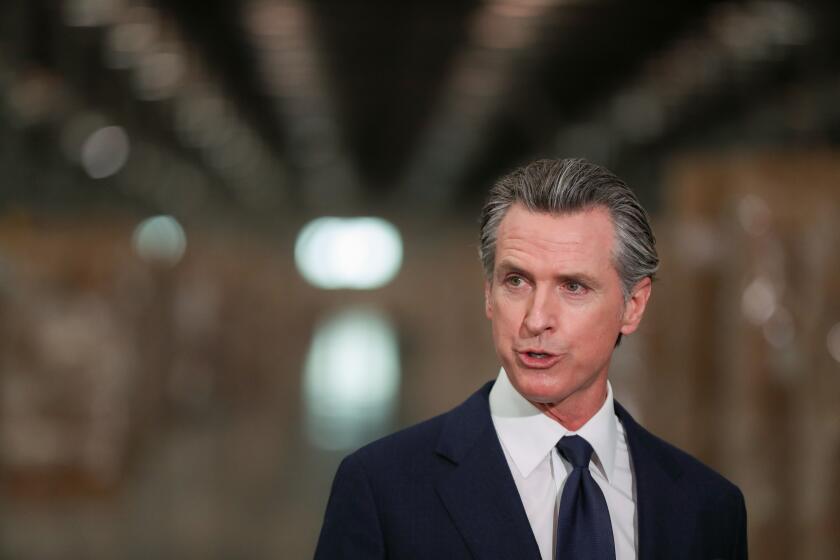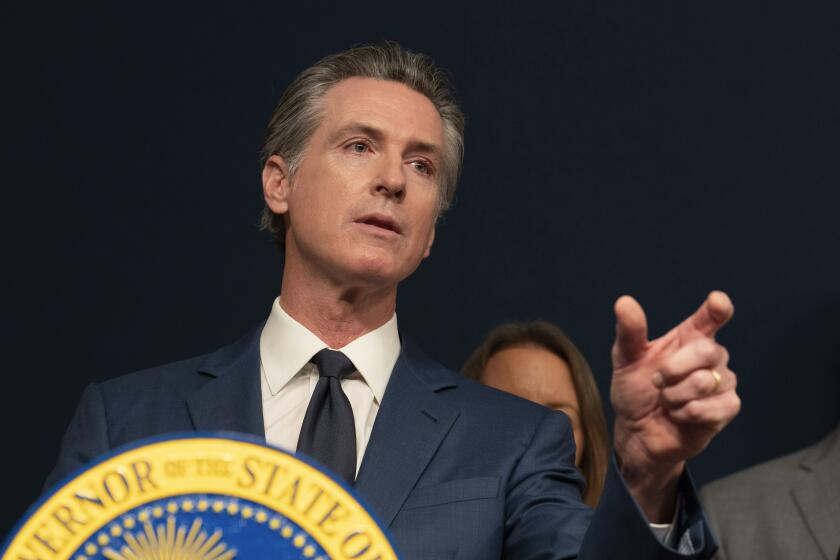‘Universal frustration’: In California, a crisis so dire Republicans and Democrats are working together

- Share via
Gov. Gavin Newsom has an unusual ally in his Proposition 1 ballot measure to boost funding for mental health: an outspoken Donald Trump supporter and Kern County lawmaker who co-chaired the committee that led the failed 2021 recall effort against the governor.
State Sen. Shannon Grove (R-Bakersfield) in September voted to place Newsom’s plan on the March 5 primary ballot. She recently wrote an opinion piece arguing in favor of his proposal to address the state’s mental health crisis and supported the California Republican Party’s decision to stay neutral on Proposition 1.
“It’s not very often that I agree with the governor, I mean, let’s just be honest,” Grove said. “But this is something that I feel we really need to do, because the bottom line is there are people on the street that desperately need this help.”
Grove’s support for Proposition 1 is emblematic of a shift in California politics: To solve a dire homelessness and mental health crisis, Republicans and Democrats are leaving their ideological corners and stepping into an unfamiliar bipartisan middle ground. In a deeply divided nation, the measure offers a rare glimpse of compromise on a policy led by one of the most politically polarizing figures in America.
Proposition 1 asks voters to update California’s aging mental health services system to increase care for drug addiction and provide more than 10,000 new treatment beds through a $6.4-billion bond. Newsom describes the measure as among a “larger constellation” of his efforts to address the most vexing problem of his governorship.
The bills that put the measure before voters received sweeping bipartisan support in the Legislature; one passed with a unanimous vote in the Senate.
A November poll from the Public Policy Institute of California found that two-thirds of likely voters back the measure. The governor’s “Yes on Prop. 1” campaign has received more than $10 million in contributions from a mixed bag of political players that includes Native American tribes, hospitals, firefighters, correctional officers, building trades unions and Uber.
Newsom said the rare bipartisanship is a response to “universal frustration.”
“When it comes to the issue of mental health and behavioral health, broadly defined as substance abuse, it touches everybody in a very personal and profound and consequential way,” he said in a recent interview. “It’s not just the blight on the streets and sidewalks and the frustration we have there. It’s in your home. It’s your kids. It’s your mom and dad. It’s the person in the mirror when you’re brushing your teeth. It’s a unity agenda, if there ever was one.”
California lawmakers approved Gov. Gavin Newsom’s mental health plan. The overhaul is his latest effort to lessen the homelessness crisis, a vexing problem for the state and its Democratic governor.
Proposition 1 is the linchpin of Newsom’s answer to a complex homelessness crisis that is intertwined with mental health issues and substance abuse. More than 8 in 10 homeless Californians have experienced a serious mental health condition, and nearly two-thirds have used illicit drugs on a regular basis, according to research by UC San Francisco.
The governor’s solutions seek to increase facilities and treatment beds for mental health, provide more funding for healthcare for substance abuse and make it easier for families and authorities to ask courts to mandate treatment for people with severe mental illness. Expanding the availability of housing, in the form of temporary shelters and permanent affordable units, and greater state oversight of local government plans are also critical parts of his solution.
“My frustration is palpable,” Newsom said. “We’re giving cities and counties the tools. I want them to use them, and it’s time to move.”
Newsom’s impatience stems from the fact that he has spent more than $28 billion to reform the state’s mental health system since taking office, and the homelessness population has only grown.
Fox News repeatedly blasts the governor for California’s homelessness crisis, and, during a prime-time debate in November, Republican Florida Gov. Ron DeSantis taunted Newsom with a map of the public spots in San Francisco where human feces had been reported.
Newsom has repeatedly criticized local governments for not taking a more aggressive stance to address housing and mental health needs in their communities as he takes on progressives in his own party by employing a more moderate approach to the problem than on any other policy issue.
Last year, he signed Senate Bill 43, which expanded the criteria for the detention, treatment and conservatorship of people with severe mental illness — against the wishes of human rights and disability advocates on the left flank of his party. CARE Court, a system that could mandate treatment for drug addiction, received similar pushback in 2022 from the American Civil Liberties Union, which worried that allowing families, doctors and authorities to petition courts to require treatment could walk back rights.
Newsom also urged the Supreme Court to take up a case to decide whether people have a constitutional right to camp on public property when they have no other place to sleep. This month, he called for the high court to “correct course and end the costly delays from lawsuits that have plagued our efforts to clear encampments and deliver services to those in need.” It’s an unusual move for the Democratic governor who more routinely criticizes the court’s conservative majority for its stance on abortion and guns.
Proposition 1 is another example of the governor resisting pressure from the left. Progressive advocates took issue with a last-minute change that allows Proposition 1 funding to be used for secure mental health facilities.
Rachel Bhagwat, a legislative advocate for the ACLU California Action, said the organization shares the governor’s concerns about the need for additional services for people with serious mental health and behavioral health needs. The ACLU, which has not yet taken a position on Proposition 1, is also concerned about the approach the state is taking.
“Our California ACLUs believe that these involuntary and coercive methods, any involuntary and coercive methods, should be used only in the most narrow of circumstances,” Bhagwat said.
Without an expansion of voluntary treatment services, community-based care and supportive housing, she said, there is a risk of people ending up in forced treatment simply because they were allowed to deteriorate without receiving support earlier on.
California voters will be asked to decide on a ballot measure in March 2024 that includes a $6.38-billion bond to pay for mental health housing and services.
Formal opposition to Proposition 1 comes largely from a group of mental health advocates and a few Republican lawmakers who opposed the bills in the Legislature and have struggled to raise money for their campaign against the measure.
Taking a more centrist position with Proposition 1 could give Newsom broader appeal as he expands his profile outside of the Golden State. Though the governor is not a candidate in the 2024 presidential election and is traveling the country as a surrogate for the Biden-Harris campaign, he’s repeatedly named as a potential contender in 2028.
“I think so many Americans are really hungry for some sign of a functional political system where the parties compromise,” said Kim Nalder, a professor of political science at Sacramento State. “And if he can be seen as somebody who is shepherding a bipartisan solution to a major problem, that’s a huge win for him.”
Newsom said his desire to fix the homelessness crisis transcends politics and is about his pride in California. His senior staff said he regularly sends pictures of encampments from his travels around the state as a reminder that they all can do better.
Sen. Brian Dahle (R-Bieber), Newsom’s opponent in his 2022 reelection, voted for SB 326, which reconfigured California’s 20-year-old Mental Health Services Act, and declined to vote on AB 531, the bond component of the measure. He said homelessness and mental health are concerns across California and in his rural northern district, where residents live on the sidewalks of Burney Falls, which has a population of 3,000.
“It’s not really a partisan issue,” Dahle said. “We don’t have the power in our party to go ahead and just reduce regulation and drive down the cost of housing, but we do have the ability to come across the aisle and say, ‘Hey, we’re going to work together,’ and I think we need more of that than less. I would love to see them come our way a lot more.”
Newsom is ramping up his campaign on Proposition 1 and released a 30-second ad Tuesday with a bipartisan message that focuses exclusively on the benefits to veterans. The measure allocates more than $1 billion in grants and loans for veteran housing.
Grove said she is the first female veteran to serve in the California Legislature.
“He’s wasted a lot of money,” she said of Newsom in an interview. “But if this is going to create 10,000 beds for us to house these chronically ill individuals, including United States military veterans that have protected and served this country, we need to do what we can do and hold him accountable in making sure the money is spent correctly.”
More to Read
Sign up for Essential California
The most important California stories and recommendations in your inbox every morning.
You may occasionally receive promotional content from the Los Angeles Times.













